INTERNACIONAL
Cuomo staying in NYC mayor’s race for now, following stunning setback to Mamdani in primary: Sources
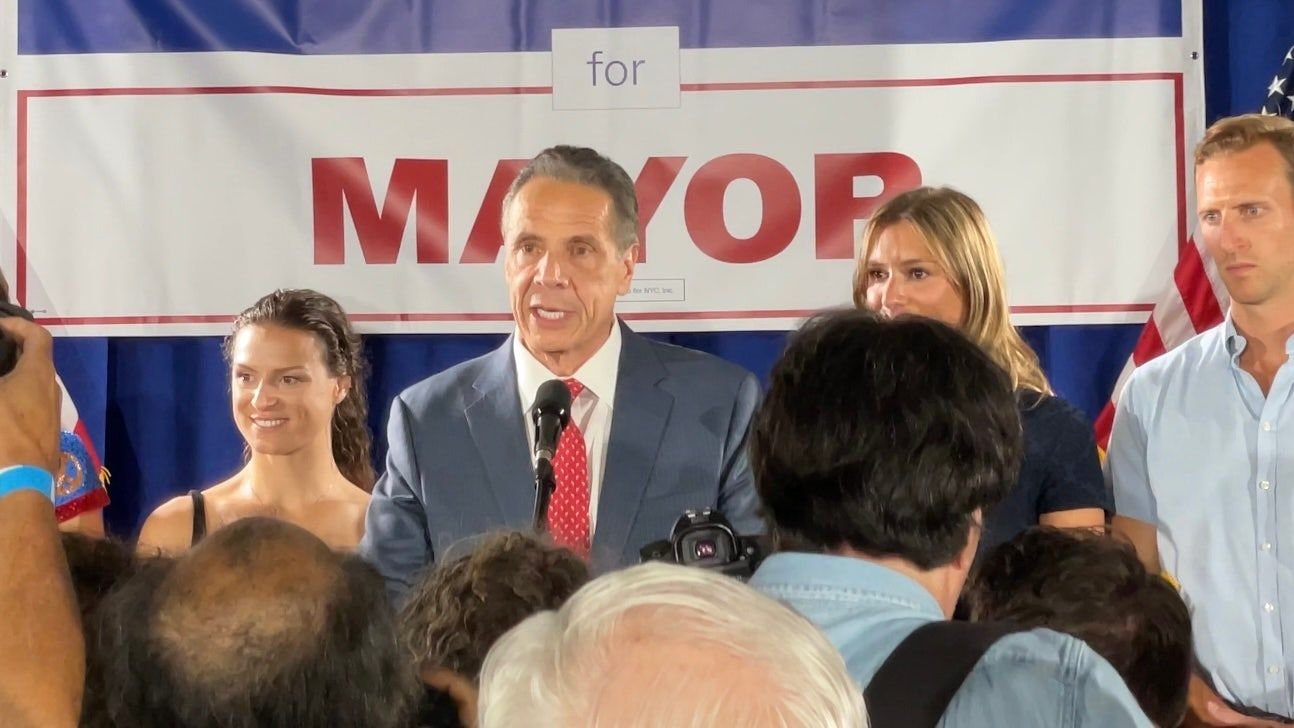
NEWYou can now listen to Fox News articles!
Andrew Cuomo is not dropping out of the race for New York City mayor.
Cuomo, the former three-term New York State governor who resigned from office in 2021 amid multiple scandals, has decided, for now, to move ahead and run in the general election as an independent candidate, two sources confirmed to Fox News on Thursday night.
The announcement by Cuomo came three days after progressive upstart Zohran Mamdani shocked the political world, as he topped Cuomo and the rest of the 11-candidate field in heavily blue New York City’s Democratic Party mayoral primary and took a big step toward becoming the first Muslim mayor of the nation’s most populous city.
Mamdani, a 33-year-old democratic socialist state assemblyman from Queens who originally hailed from Uganda, captured 43.5% of the first round unofficial primary results, with Cuomo at 36.4%.
REPUBLICANS USE MAMDANI BOMBSHELL VICTORY OVER CUOMO AS AMMUNITION TO BLAST DEMOCRATS AS EXTREMISTS
Democratic mayoral candidate Zohran Mamdani takes the stage at his primary election party on Wednesday, June 25, 2025 in New York. (AP Photo/Heather Khalifa)
While he acknowledged Mamdani’s victory in the primary, Cuomo left the door open to a November run as an independent candidate, which election rules in New York State permit.
«I want to look at all the numbers as they come in and analyze the rank choice voting. I will then consult with my colleagues on what is the best path for me to help the City of New York, as I have already qualified to run for mayor on an independent line in November,» Cuomo said in a statement.
Cuomo was facing an end-of-the-day Friday deadline for candidates who had already qualified to run as independents to decline that independent ballot line.
The former governor will keep his place that he already secured earlier this year on the «Fight & Deliver» ballot line. But the sources said that Cuomo had not committed yet to running an active general election campaign through the summer and into the autumn.
If Cuomo drops out of the race at a later date, his name will stay on the general election ballot.
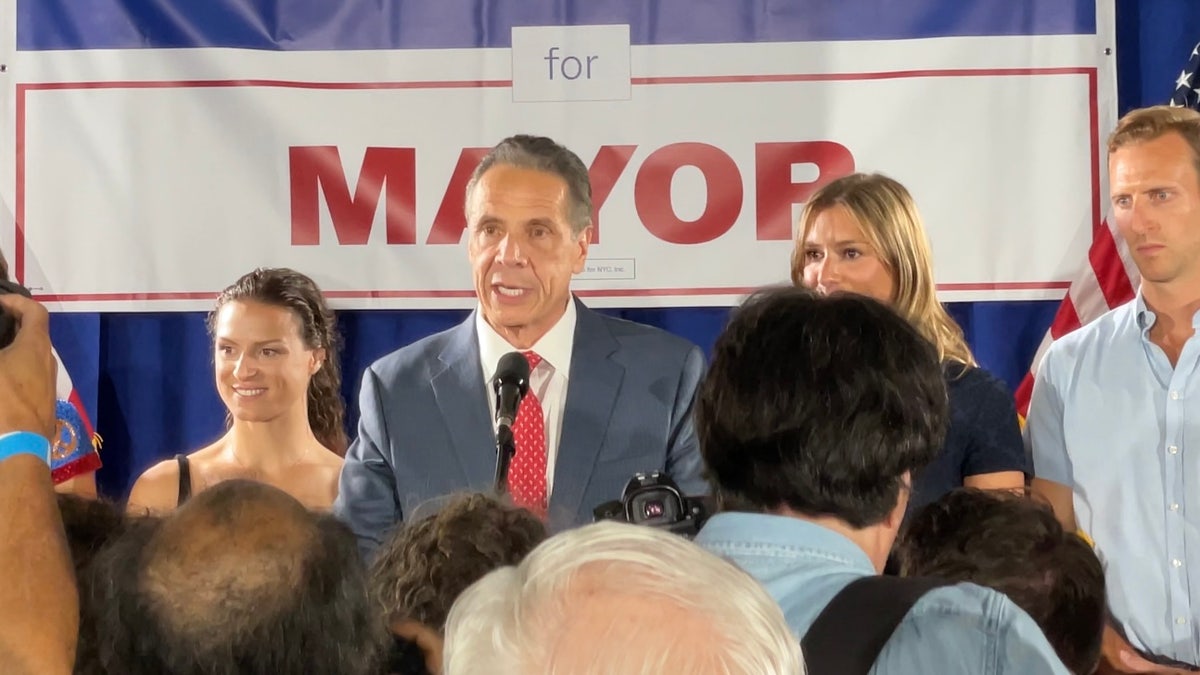
Former New York Gov. Andrew Cuomo, in a speech to supporters, acknowledges that rival Zohran Mamdani ‘won’ the New York City Democratic Party mayoral primary, on June 24, 2025, in New York, N.Y. (Paul Steinhauser – Fox News)
Once a longshot in the race, Mamdani closed the gap with Cuomo during the final stretch of the primary race thanks to an energetic campaign that focused in part on New York City’s high cost of living.
Endorsements by Rep. Alexandria Ocasio-Cortez, the progressive rock star and New York City’s most prominent leader on the left, and by Sen. Bernie Sanders of Vermont, the progressive champion and two-time Democratic presidential nominee runner-up, helped Mamdani consolidate much of New York City’s Democratic Party base
WHAT MAMDANI’S STUNNING PRIMARY VICTORY MEANS FOR DEMOCRATS NATIONWIDE
And Mamdani rode a wave of support from younger and first-time voters to catapult himself into first place.
«I will be the mayor for every New Yorker,» Mamdani said in his victory speech. «Whether you voted for me, or for Governor Cuomo, or felt too disillusioned by a long broken political system to vote at all, I will fight for a city that works for you, that is affordable for you, that is safe for you.»
Since none of the candidates topped 50%, counting technically now heads into rounds of ranked-choice elimination. But the combined totals of votes Mamdani and other aligned progressive candidates won are likely to be more than enough to topple Cuomo as the ranked-choice tabulations begin on July 1.
Cuomo, seeing the writing on the wall, admitted defeat and complimented Mamdani as the initial primary results poured in on Tuesday, telling supporters that «tonight is his night. He deserved it. He won.»
Cuomo, in an interview on Wednesday with CBS New York, noted that «in the general election, more people come out to vote. It’s a broader pool, if you will, of New Yorkers, more representative pool of New Yorkers.»
«There are about 5 million voters in New York City, there are about 8 million people in New York City, and about 1 million people vote in the Democratic primary. So it’s not, necessarily, representative of the city at large,» the former governor said.
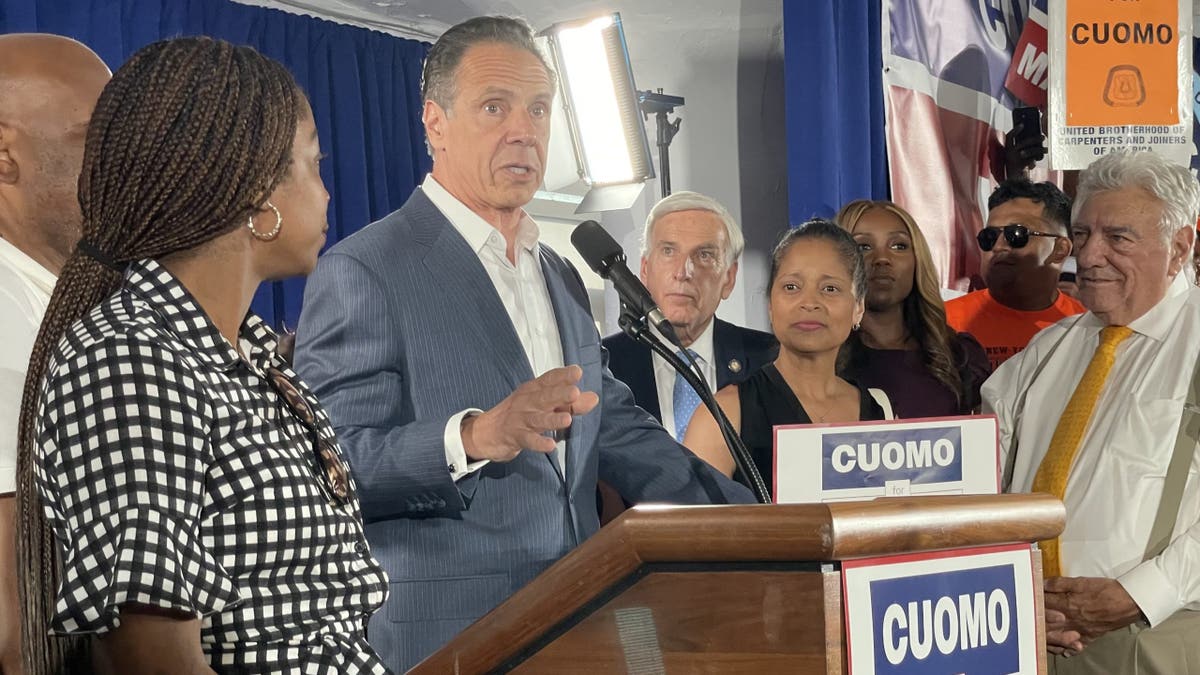
Former New York State Gov. Andrew Cuomo, the frontrunner in the race for the New York City Democratic Party mayoral primary, speaks to a large crowd of union supporters, on primary eve, June 23, 2025. (Paul Steinhauser – Fox News)
And a poll from a consulting and lobbying group that was aligned with an outside group supporting Cuomo released a poll on Thursday that suggested Mamdani and Cuomo tied in a possible general election matchup, with incumbent Mayor Eric Adams – a Democrat who’s running for re-election as an independent – and Republican nominee Curtis Sliwa far behind.
Sliwa, the founder of the volunteer crime-fighting patrols known as the Guardian Angels, ran for a second straight election cycle. Also running this November as an independent is former federal prosecutor Jim Walden.
Asked if Cuomo should drop out of the race, Mamdani said Thursday in an interview with Fox News affiliate WNYW in New York that «I think there’s room for everyone because, ultimately, we’re going to win it.»
The 67-year-old Cuomo has spent the past four years fighting to clear his name after 11 sexual harassment accusations, which he has repeatedly denied, forced his resignation. He was also under investigation at the time for his handling of the COVID-19 pandemic amid allegations his administration vastly understated COVID-related deaths at state nursing homes.
Last month, the Justice Department opened a criminal investigation into Cuomo after Republicans accused him of lying to Congress about the decisions he made as governor during the coronavirus pandemic.
Cuomo, thanks to his name recognition, was the front-runner in the polls even before he announced his candidacy earlier this year. But he ran a safe campaign that relied on union support, and he shied away from often engaging with local or national media.
Mamdani, meanwhile, made smart use of social media platforms, including TikTok, as he engaged the primary electorate. He proposed eliminating fares to ride New York City’s vast bus system, making CUNY (City University of New York) «tuition-free,» freezing rents on municipal housing, offering «free childcare» for children up to age five, and setting up government-run grocery stores.
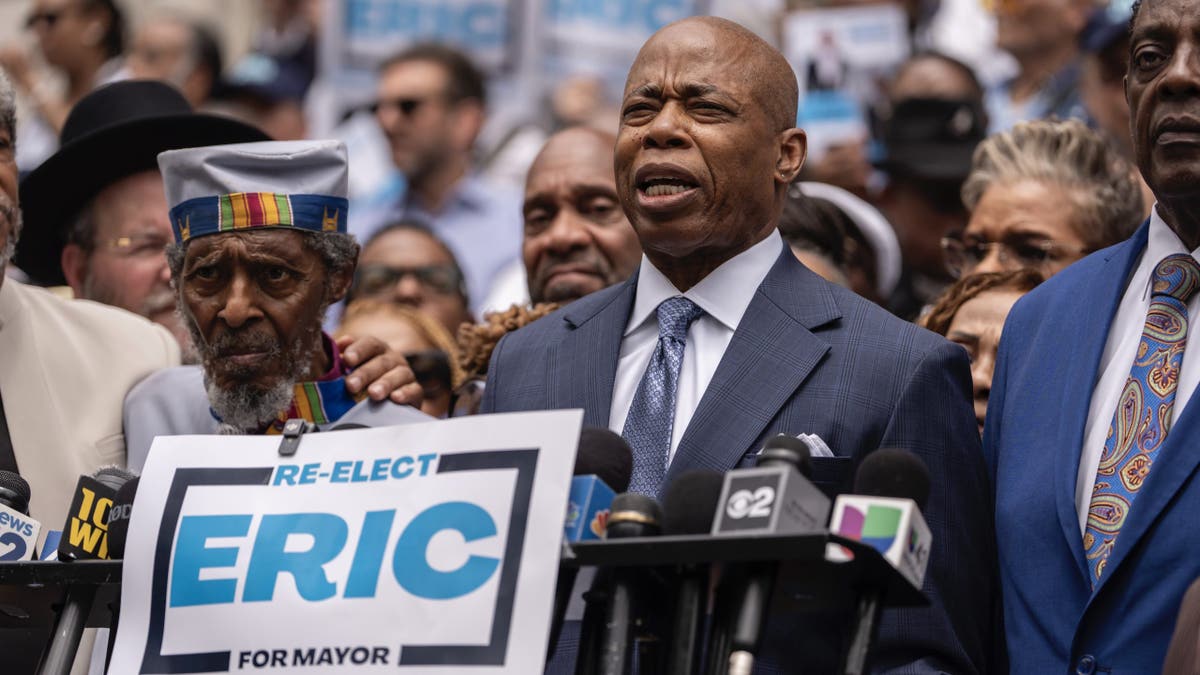
New York Mayor Eric Adams speaks during a campaign launch rally at City Hall, Thursday, June. 26, 2025, in New York. (AP Photo/Yuki Iwamura) (AP Photo/Yuki Iwamura)
Adams, in formally launching his campaign on Thursday on the steps of City Hall, said «this is a city not of socialism,» in an obvious jab at Mamdani’s proposals.
«There’s no dignity in someone giving you everything for free. There’s dignity in giving you a job, so you can provide for your family and the opportunities that you deserve. This is not a city of handouts. This is a city of hands up.»
CLICK HERE TO GET THE FOX NEWS APP
Adams’ poll numbers were sinking even before he was indicted last year on five counts, which accused the mayor of bribery and fraud as part of an alleged «long-running» scheme to personally profit from contacts with foreign officials.
The mayor made repeated overtures to President Donald Trump, and the Justice Department earlier this year dismissed the corruption charges, so Adams could potentially work with the Trump administration on its illegal immigration crackdown.
He announced in early April that he would run for re-election as an independent and forgo the Democratic primary.
INTERNACIONAL
Panorama Internacional: guerra y paz, el orden mundial a golpe de mouse
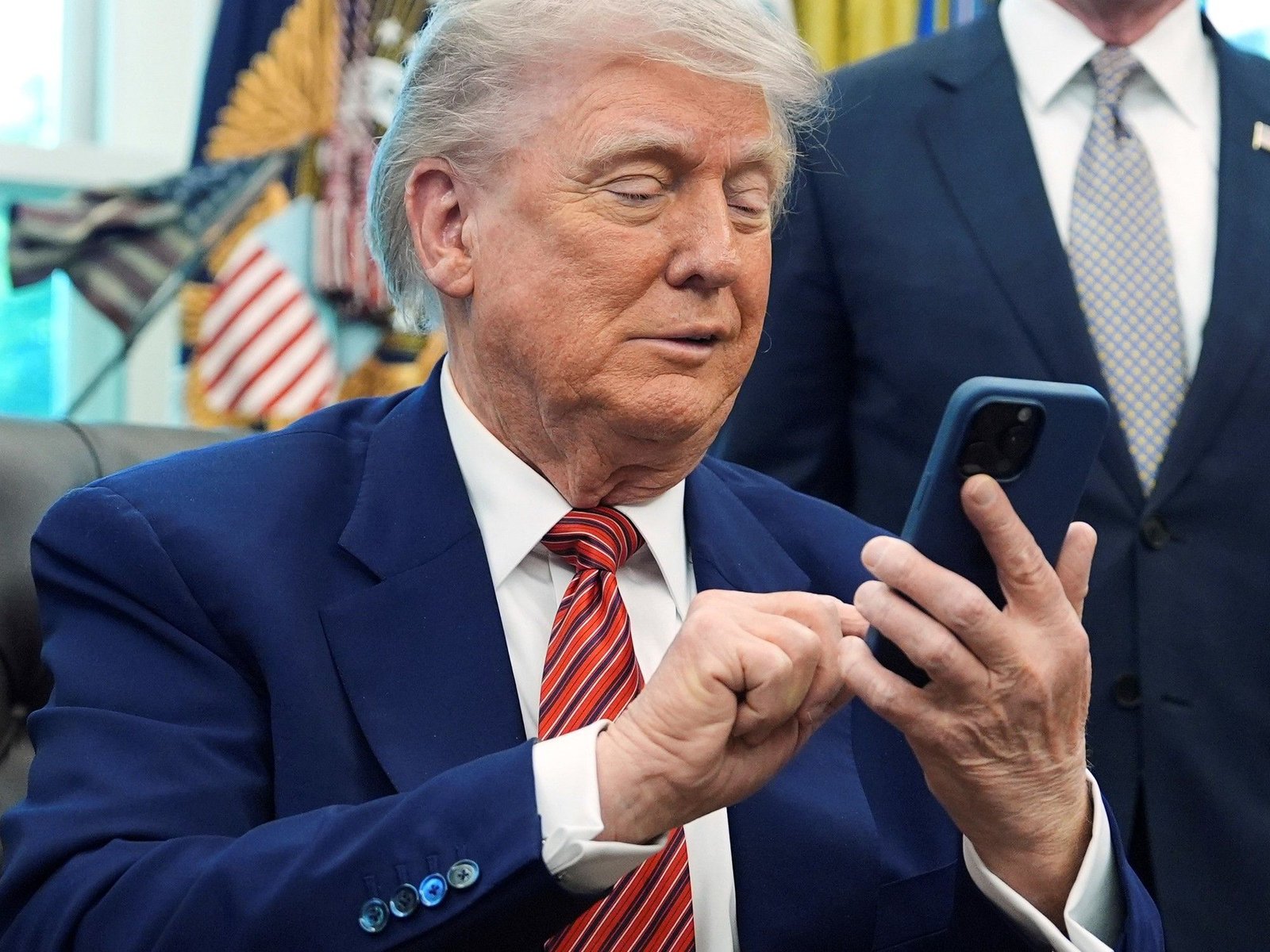
Costos y beneficios
Regreso al punto de partida
INTERNACIONAL
‘Presidential incapacity’: Senate Republican seeks paper trail of Biden’s autopen use
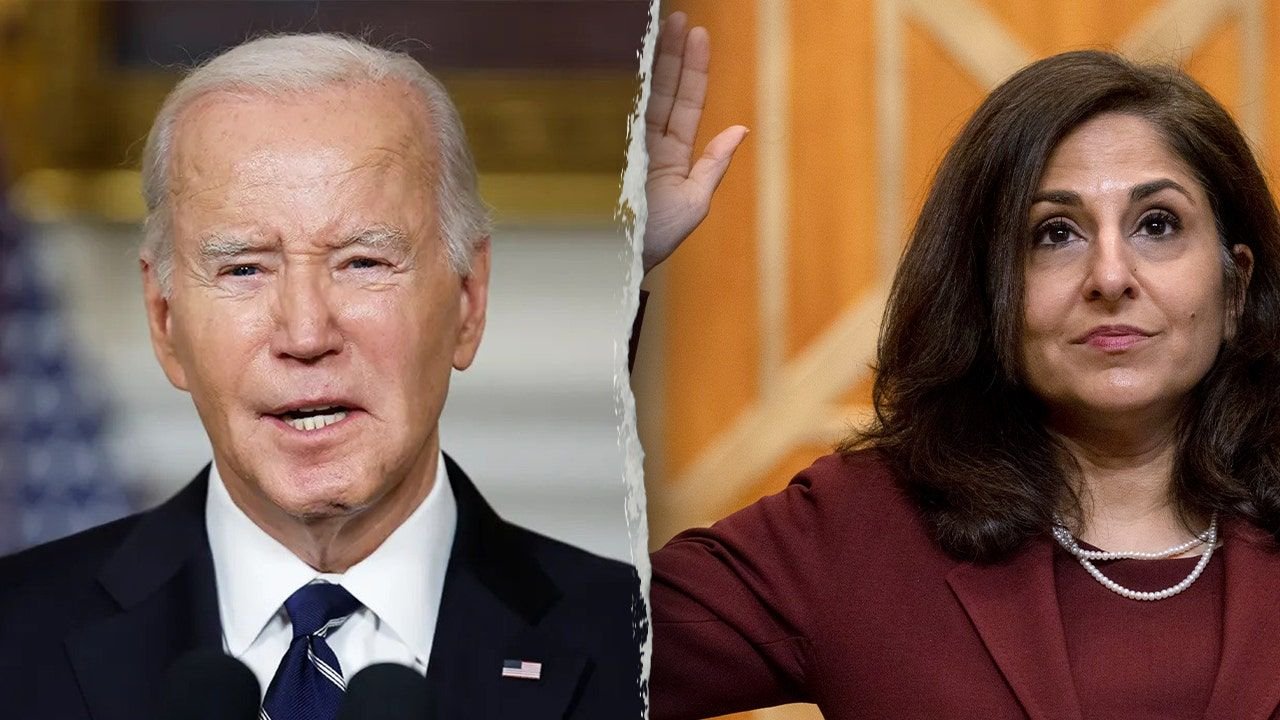
NEWYou can now listen to Fox News articles!
FIRST ON FOX: A Senate Republican wants to build a paper trail of former President Joe Biden’s autopen usage with the end goal of calling more hearings, passing legislation or amending the Constitution to best address «a mentally incapacitated president.»
Sen. Eric Schmitt, chair of the Senate Judiciary Subcommittee on the Constitution, is requesting special access under the Presidential Records Act to a trove of Biden-era documents and memos that chronicle his usage of an autopen.
In a letter to Secretary of State and Acting National Archivist Marco Rubio exclusively obtained by Fox News, Schmitt argued that creating a paper trail of key directives made toward the end of his presidency would help in «deciding which legislative remedy is most appropriate.»
TOP BIDEN AIDE ADMITS TO CONGRESS SHE DIRECTED AUTOPEN SIGNATURES WITHOUT KNOWING WHO GAVE FINAL APPROVAL
Neera Tanden, the former director of Biden’s Domestic Policy Council, testified for more than five hours Tuesday behind closed doors as part of House Republicans’ investigation into the former president’s mental acuity and his use of an automatic signature tool. (Getty Images)
«In particular, the increased use of the autopen to sign pardons, executive orders, and other documents as his Presidency progressed became a poignant symbol of President Biden’s mental decline and has created questions about the validity of those orders and pardons if President Biden did not direct the use of the autopen,» he wrote.
Schmitt requested access to a slew of documents, including memos about procedures for usage of the autopen, who was granted authority to use the autopen and emails from staff authorizing or requesting authorization for autopen usage.
SENATE HEARING ON WHO WAS ‘REALLY RUNNING’ BIDEN WHITE HOUSE KICKS OFF WEDNESDAY
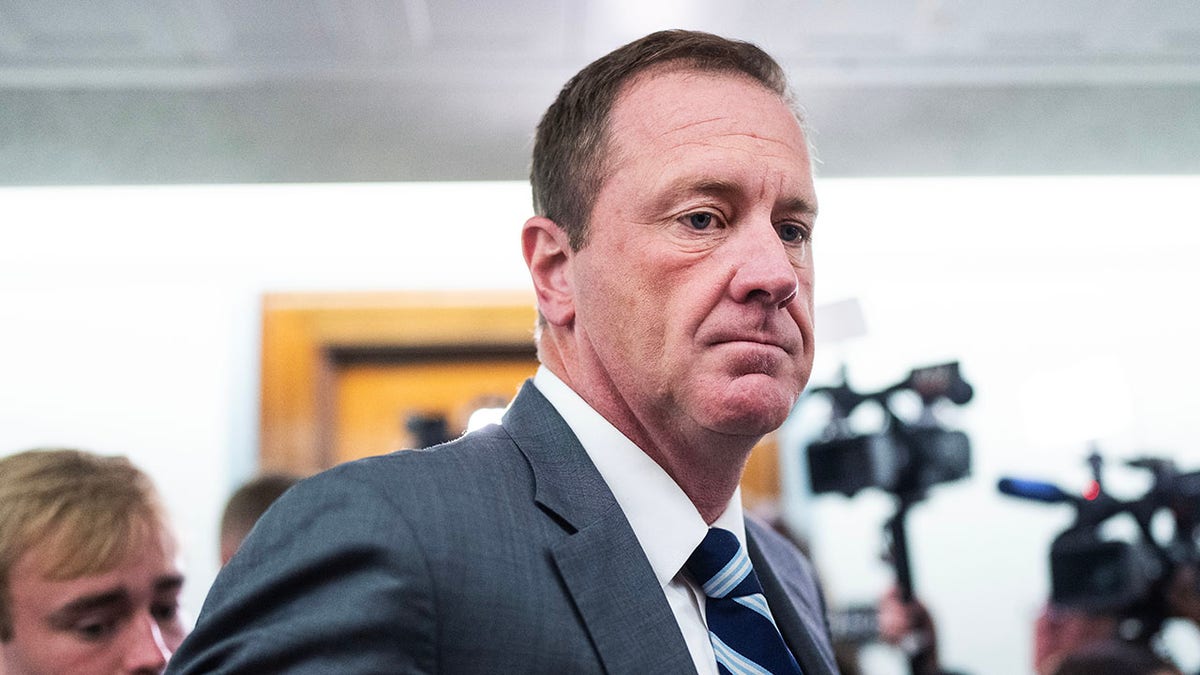
Sen. Eric Schmitt, R-Mo., arrives for a Senate Judiciary Committee hearing in Dirksen building Tuesday, June 17, 2025. (Getty Images)
He also requested access to all White House records after Nov. 1, 2024, that refer or relate to presidential pardons; that prioritize briefing books, memos and decision memos for pardons; and, eventually, access to all White House records after Nov. 1.
«With that information, the subcommittee will be better positioned to ensure that any potential proposed amendment will be sufficiently comprehensive so as to address any plausible contingency concerning a mentally incapacitated President,» Schmitt wrote.
«It would be challenging enough to amend the Constitution once — much less more than once if it then subsequently turned out not all contingencies around presidential incapacity were adequately considered.»
Schmitt’s letter comes after the Senate Judiciary Committee’s hearing on Biden’s alleged mental decline while in office and how the autopen could have played a central role in his inner circle’s alleged attempt to skirt the Constitution while continuing to carry out the duties of the office.
EX-WHITE HOUSE OFFICIALS TO TESTIFY ON WHO ‘REALLY RAN THE COUNTRY’ DURING BIDEN ERA
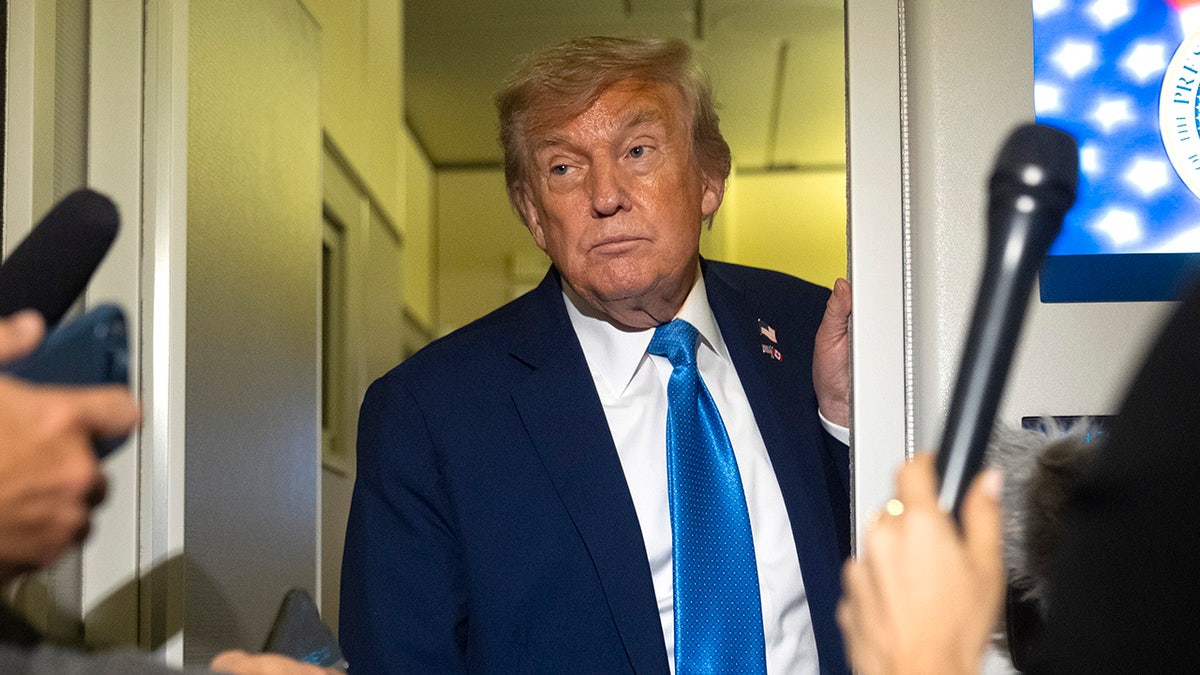
President Donald Trump speaks with reporters while flying aboard Air Force One en route from Calgary, Canada, to Joint Base Andrews, Maryland, late Monday, June 16, 2025. (AP Photo/Mark Schiefelbein)
It also explicitly mentions the closed-door, transcribed hearing with Biden’s former director of the Domestic Policy Council, Neera Tanden, conducted by the House Oversight Committee this week.
A source told Fox News Digital that during the transcribed interview, which lasted five hours, Tanden testified she had «minimal interaction with President Biden» in her role as staff secretary and that to obtain autopen signatures, she would send decision memos to members of Biden’s inner circle.
She said during the interview she was not aware of what actions or approvals happened between the time the memo was sent out and returned with approval.
However, Tanden’s opening statement, shared with Fox News Digital by her lawyer, Michael Bromwich, said that, as staff secretary, she was responsible for «handling the flow of documents to and from the President» and that she was authorized to direct that autopen signatures be «affixed to certain categories of documents.»
«We had a system for authorizing the use of the autopen that I inherited from prior Administrations,» Tanden said. «We employed that system throughout my tenure as Staff Secretary.»
She was later named director of Biden’s Domestic Policy Council and said she was no longer responsible for the flow of documents and was no longer involved in decisions related to the autopen.
«I would note that much of the public discussion on the subject matter of this hearing has conflated two very different issues: first, the president’s age and second, whether President Bident was in command as President,» she said. «I had no experience in the White House that would provide any reason to question his command as President. He was in charge.»
CLICK HERE TO GET THE FOX NEWS APP
Schmitt requested that access to the swathe of memos and communications be granted no later than July 16.
«It is important for this subcommittee to have a clear picture of President Biden’s decision-making capacity at the end of his presidency and to know the extent to which members of his inner circle possibly usurped the President’s decision-making authority,» he wrote.
Fox News Digital’s Liz Elkind contributed to this report.
INTERNACIONAL
China confirmó el acuerdo sobre tierras raras y exportaciones con EEUU tras una nueva ronda de negociaciones en Londres
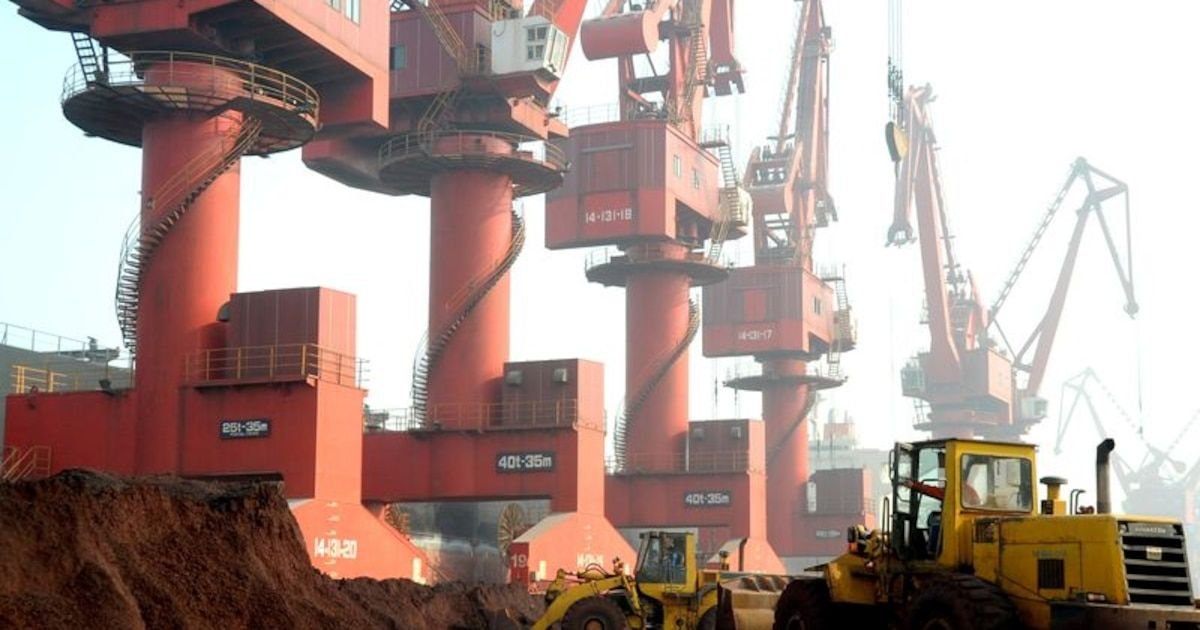
China y Estados Unidos alcanzaron un acuerdo definitivo sobre la exportación de bienes estratégicos, incluidas las tierras raras, tras concluir su última ronda de negociaciones en Londres. Así lo confirmó este viernes el Ministerio de Comercio chino mediante un comunicado oficial, en el que informó que ambos gobiernos “mantuvieron una comunicación cercana” tras el encuentro y que “con aprobación, ambas partes confirmaron los detalles del acuerdo”.
El documento aclara que, como parte del entendimiento, “China revisará y aprobará las solicitudes de exportación de bienes controlados que cumplan con las condiciones con arreglo a la ley”, en una clara referencia a las restricciones impuestas por Beijing a principios de abril sobre la venta de minerales críticos como las tierras raras. Estos recursos son fundamentales para industrias clave, como la defensa, la tecnología avanzada o el sector automotriz.
A cambio, Estados Unidos se compromete a eliminar “una serie de medidas restrictivas” adoptadas contra China, aunque el comunicado no detalla cuáles serán levantadas ni en qué plazos. Esta medida corresponde a lo pactado en la conversación del 5 de junio entre el presidente chino Xi Jinping y su homólogo estadounidense Donald Trump, que habilitó la reanudación de los contactos comerciales a nivel técnico.

“Se espera que EEUU y China encuentren un término medio y cumplan con los importantes consensos y requisitos alcanzados por los jefes de Estado”, señala el comunicado, refiriéndose al diálogo presidencial que facilitó la reactivación de las negociaciones formales en la capital británica.
La confirmación de este acuerdo por parte del gobierno chino se produce un día después de que Trump asegurara que “Estados Unidos firmó un acuerdo con China” en una declaración pública, aunque sin ofrecer precisiones. Según había adelantado el mandatario republicano a mediados de junio, el pacto incluye un arancel del 55 % impuesto por EEUU a productos chinos y un 10 % recíproco por parte de Beijing sobre bienes estadounidenses.
El acuerdo de Londres sella un marco de cooperación basado en el “consenso” alcanzado en la llamada presidencial, pero se mantenía pendiente de la ratificación final de ambos líderes. La firma llega tras una serie de tensiones renovadas, motivadas por acusaciones cruzadas de incumplimiento del pacto alcanzado en mayo en Ginebra, que dio origen a una tregua comercial de 90 días.
En el marco de ese entendimiento previo, China había reducido sus aranceles a productos estadounidenses del 125% al 10%, mientras que Washington rebajó los suyos del 145% al 30% sobre bienes chinos. Sin embargo, ambas partes se acusaron mutuamente de violar el acuerdo: Beijing denunció restricciones estadounidenses sobre la exportación de chips de inteligencia artificial y software de diseño de semiconductores, así como medidas migratorias contra estudiantes chinos. Washington, por su parte, criticó las limitaciones chinas sobre la exportación de tierras raras.
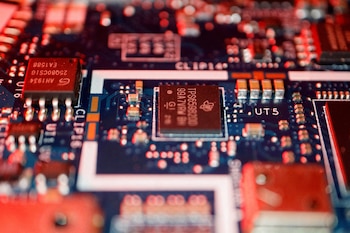
La disputa comercial entre ambos países se intensificó desde el regreso de Donald Trump a la Casa Blanca, con una renovada ofensiva arancelaria que reactivó la guerra comercial iniciada en 2018. Esta escalada ha derivado en una situación de embargo parcial, con efectos globales sobre cadenas de suministro y mercados estratégicos.
Con este nuevo acuerdo, China y Estados Unidos buscan desescalar las tensiones mediante compromisos mutuos en comercio y exportaciones clave. No obstante, aún queda por determinar cómo se implementarán las medidas anunciadas y si ambas partes cumplirán los plazos y condiciones fijados. Por ahora, el entendimiento representa un paso más en la volátil relación bilateral entre las dos principales economías del mundo.
(Con información de EFE y AFP)
Asia / Pacific,LIANYUNGANG
-

 INTERNACIONAL3 días ago
INTERNACIONAL3 días agoLa guerra en Oriente Medio: el Pentágono contradice a Donald Trump y asegura que el bombardeo a Irán solo retrasó su plan nuclear un par de meses
-
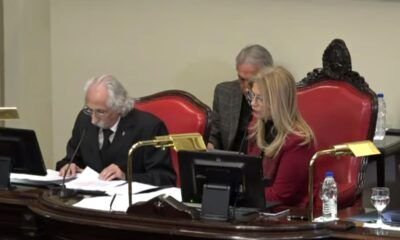
 POLITICA2 días ago
POLITICA2 días agoCon un desempate de Magario, el Senado bonaerense aprobó la reelección indefinida de los legisladores provinciales
-

 POLITICA3 días ago
POLITICA3 días agoRenunció la jueza Julieta Makintach en la antesala de un juicio político en su contra



















